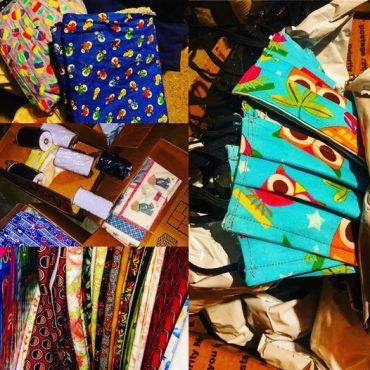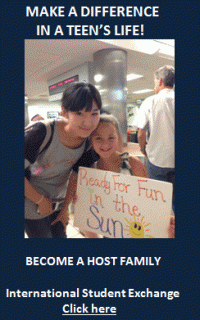By Miriam Raftery

May 4, 2020 (El Cajon) –“Helping other people was the only way that I survived through different risks and wars I went through,” says Kilian Colin, an Iraqi refugee in El Cajon who says he went through lockdowns in Iraq and Syria. A long-time civil rights and labor activist, he has now started a mask-making campaign that is protecting thousands of the most vulnerable people during the COVID-19 pandemic.
His masks have been sent to protect healthcare workers in San Diego and in cities across the nation including had-hit New York City, as well as to farmers in the Midwest, farmworkers in Oregon, asylum seekers in Mexico, and tribal members of the Navajo Nation in Arizona.
How the effort began
“I was visiting Asia in January when the pandemic started,” says Colin, who began wearing masks in Vietnam and Taiwan. Back home as a student at San Diego State University, he kept wearing a mask to avoid infecting others.
But he recalls, “Both professors and students at SDSU were making fun of me…I had no option but to face some of those bullies and told them I was protecting them by wearing this mask, since I had no idea if I carried the virus with me home.”
In mid-March, SDSU moved classes online. Without spending an hour daily commuting, Colin decided to make several masks instead and offer them online to whoever needed them, also replacing his own surgical masks that had been washed too many times to be protective.
“I looked online for patterns to make masks and I looked in my closet for clothes that I no longer use,” he tells East County Magazine in an exclusive interview.
His first masks took an hour and a half each to make, while he watched shows on Netflix. Just hours after he offered seven masks on Facebook to those in need, Colin heard from a friend who offered him a sewing machine. Another friend offered to buy $200 worth of fabric – if he would make 200 masks for asylum seekers waiting in crowded camps in Mexico for their asylum hearings in the U.S.
So he went on YouTube to learn how to use a sewing machine, maintain it and adjust the thread tension. He was able to make his next mask in just 30 minutes using the sewing machine instead of sewing by hand. Then he posted photos on Facebook during spring break.
Demand surges

“People from all over the country started to message me and ask for masks for local healthcare workers,” he says. “I put up a fundraiser on Facebook to help me buy more fabric and I was so lucky to find generous people from all over the country to donate to my campaign. The Minority Humanitarian Aid Foundation, Lemon Grove City Councilman David Arambula, Oasis Legal Aid Foundation and [San Diego] City Council candidate Kelvin Barrios made very generous contributions,” he says.
Soon he was making 50 masks daily, working 12 hours a day.
“It was a power that I never thought I had in the past,” he reflects. “It comes with some sacrifices and risk-taking when going to stores to buy fabric and other supplies to make masks.”
Colin says he is at “high risk due to my immune compromised system.” So he dons a double face mask, a chemistry lab goggle and face shield to shop. He sprays his car and products with disinfectants, then upon returning home, he takes a shower, then washes, dries, irons and cuts all the fabric into patterns.
He says he made “hours of mistakes” learning the best techniques to make masks – all of which he’s done as a volunteer.
Soon he and organizations that backed his effort were shipping masks across the country to help healthcare workers, farmworkers, asylum seekers and next up, Native Americans.
“My latest project is to make/collect masks for our brothers and sisters in the Navajo Nation,” says Colin. After hearing about devastating rates of COVID-19 on the Navajo reservation in Arizona, he says he began working with contacts on the reservation to deliver 600 masks to help stop spread of the deadly virus.
Community members locally responded by sending donations of money, fabric and even masks to help the Navajo people. He says, “My heart is overwhelmed with the support that I got from people around our country to help with my Navajo Nation aid project.”
On Facebook, people have praised his efforts. One woman called him a “guardian angel.” Councilman Arambula wrote, “You’ve inspired many of us to join your selfless efforts and making a difference in countless others! Thank you, thank you, thank you!”
Lessons learned – and hope for humanity
Despite losses some may face due to COVID-19, Colin wants each of us to remember this pandemic by “how many people you helped.”
He concludes, “This pandemic might have showed us the worst in our country leadership, politics and the worst of people protesting the lockdown. But it also showed that most of us are united behind a great cause to save and support each other during this pandemic. If you are helping your fellow human being during this pandemic, please take a minute and be proud of your kindness and generosity.”
How you can help
Donations of fabric and elastic, rubbing alcohol and sewing machines are welcome as more people step forward to help him sew masks to meet the growing needs to protect as many people as possible.
Ultimately, Colin hopes to find a nonprofit to partner with, so that donations can be tax deductible.
For now, you can donate on Facebook at https://www.facebook.com/donate/263165784691058/, via Venmo @Kilian-Colin https://venmo.com/code?user_id=2613438551425024213 or at PayPal.me/kiliancolin. For questions, contact Kilian Colin at kytaay@gmail.com.
The former refugee now helping to save lives a world away concludes, “Thank you from the bottom of my heart for every guardian angel that is supporting me in this project.”













Recent comments